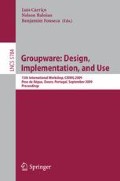Abstract
This paper discusses the negotiation-collaboration process: a binomial process mixing collaboration, negotiation and argumentation. We applied the negotiation-collaboration process to Formal Technical Reviews, commonly adopted to verify the functional specification of software. We developed a groupware tool demonstrating the dynamic of the negotiation-collaboration process in Formal Technical Reviews. And we provide results from an experiment with the tool in a software engineering firm. The obtained results demonstrate the negotiation-collaboration process promotes bigger participation in FTR.
Access this chapter
Tax calculation will be finalised at checkout
Purchases are for personal use only
Preview
Unable to display preview. Download preview PDF.
References
Pressman, R.: Software Engineering a Practitioner’s Approach. McGraw-Hill, Inc., New York (2000)
Antunes, P., Ramires, J., Respício, A.: Addressing the Conflicting Dimension of Groupware: A Case Study in Software Requirements Validation. Computing and Informatics 25, 523–546 (2006)
Fagan, M.: Design and Code Inspections to Reduce Errors in Program Development. IBM Systems Journal 15, 182–211 (1976)
Grünbacher, P., Halling, M., Biffl, S., Kitapci, H., Boehm, B.: Integrating Collaborative Processes and Quality Assurance Techniques: Experiences from Requirements Negotiation. Journal of Management Information Systems 20, 9–29 (2004)
Veenendaal, E. (ed.): Standard Glossary of Terms Used in Software Testing. International Software Testing Qualifications Board (2007)
Janis, I.: Groupthink: Psychological Studies of Policy Decisions and Fiascoes. Houghton Mifflin, Boston (1983)
Esser, J.: Alive and Well after 25 Years: A Review of Groupthink Research. Organizational Behavior and Human Decision Processes 73, 116–141 (1998)
Schwenk, C., Valacich, J.: Effects of Devil’s Advocacy and Dialectical Inquiry on Individuals Versus Groups. Organizational Behavior and Human Decision Processes 59, 210–222 (1994)
Ramires, J., Antunes, P., Respício, A.: Software Requirements Negotiation Using the Software Quality Function Deployment. In: Fukś, H., Lukosch, S., Salgado, A.C. (eds.) CRIWG 2005. LNCS, vol. 3706, pp. 308–324. Springer, Heidelberg (2005)
Haag, S., Raja, M., Schkade, L.: Quality Function Deployment Usage in Software Development. Communications of the ACM 39, 41–49 (1996)
Gutwin, C., Greenberg, S.: The Effects of Workspace Awareness Support on the Usability of Real-Time Distributed Groupware. ACM Transactions on Computer-Human Interaction 6, 243–281 (1999)
Karacapilidis, N., Papadias, D.: Computer Supported Argumentation and Collaboration Decision Making: The Hermes System. Information Systems 26, 259–277 (2001)
Vetschera, R.: Preference Structures of Negotiators and Negotiation Outcomes. Group Decision and Negotiation 15, 111–125 (2006)
Jennings, N., Faratin, P., Lomuscio, A., Parsons, S., Sierra, C., Wooldridge, M.: Automated Negotiation: Prospects, Methods and Challenges. Group Decision and Negotiation 10, 199–215 (2001)
Dubrovsky, V., Kiesler, S., Sethna, B.: The Equalization Phenomenon: Status Effects in Computer-Mediated and Face-to-Face Decision-Making Groups. Human-Computer Interaction 6, 119–146 (1991)
Raiffa, H., Richardson, J., Metcalfe, D.: Negotiation Analysis. In: The Science and Art of Collaborative Decision Making. Harvard Business Press, Cambridge (2002)
Weingart, L., Bennett, R., Brett, J.: The Impact of Consideration of Issues and Motivational Orientation on Group Negotiation Process and Outcome. Journal of Applied Psychology 78, 504–517 (1993)
Fjermestad, J., Hiltz, S.: An Assessment of Group Support Systems Experimental Research: Methodology and Results. Journal of Management Information Systems 15, 7–149 (1999)
Borges, M.R., Pino, J.A., Fuller, D.A., Salgado, A.C.: Key issues in the design of an asynchronous system to support meeting preparation. Decision Support Systems 27, 269–287 (1999)
Author information
Authors and Affiliations
Editor information
Editors and Affiliations
Rights and permissions
Copyright information
© 2009 Springer-Verlag Berlin Heidelberg
About this paper
Cite this paper
Linhares, G.B.R., Borges, M.R.S., Antunes, P. (2009). Negotiation-Collaboration in Formal Technical Reviews. In: Carriço, L., Baloian, N., Fonseca, B. (eds) Groupware: Design, Implementation, and Use. CRIWG 2009. Lecture Notes in Computer Science, vol 5784. Springer, Berlin, Heidelberg. https://doi.org/10.1007/978-3-642-04216-4_29
Download citation
DOI: https://doi.org/10.1007/978-3-642-04216-4_29
Publisher Name: Springer, Berlin, Heidelberg
Print ISBN: 978-3-642-04215-7
Online ISBN: 978-3-642-04216-4
eBook Packages: Computer ScienceComputer Science (R0)

